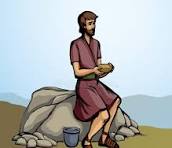The Rich Fool

Luke 12:13-21
This parable needs to be read in relation to the verses preceding it, where Jesus is asked – as it was common to ask Rabbis – to intervene in a property dispute. From the text we can assume there was an estate held by two brothers. Their father had died. The inheritance in Jewish law could not be divided unless the older brother agreed. The petitioner therefore must be the younger brother, who is demanding that Jesus press his older brother into making a division. The younger brother cries out for justice.
And Jesus doesn’t oblige. That is, Jesus wants to widen the discussion. What is justice? What is the purpose of material possessions? And where does God feature in all this?
Two brothers, a father, and a farm of course brings to our mind the parable commonly called ‘The Prodigal Son.’ In that story the younger asks for the division of the property before the father is dead, receives the inheritance, and then squanders it. In doing so he insults the father, threatens the financial viability of the farm and its dependents, and falls out with his brother. The moral of that parable, different from today’s, is that despite all these destructive actions reconciliation is still possible.
Where the two stories are similar is firstly around the viability of the farm and the care for its dependents. The dependents being all those who are not of wealthy means like the brothers, but are labourers, servants, and children, suppliers, and customers. Is the petitioner of Jesus, crying for justice, in today’s text considering the impact on the whole farm community, or is the demand for justice (like with the Prodigal) just about himself and his needs?
And secondly, the stories are similar in that Jesus’ end game is reconciliation in the family, between the brothers, not division.
Luke calls being concerned only about ourselves and our needs ‘greed.’ Which we might consider a bit harsh. Yet greed and self-centredness are almost synonymous in the Bible. For the tradition teaches that the self is always a part of otherselves, a family and community of selves, to whom we have responsibilities (social obligations) and from whom we receive privileges (opportunities and support).The idea of a self-made man (or woman) would be laughable in the Biblical context. Everything we have and are, our birth, our formation, our circumstances, our abilities, are the work of God mediated through family, community, and grace. Even in the Joseph saga, where his family is violent towards him (his brothers leaving him to die in the desert), the storytellers credit his success not to his remarkable talents (though Joseph had quite an inflated sense of his own importance!) but as the work and grace of God.
The idea of a ‘self-made’ person therefore is an idolatrous myth, for it replaces God with the self.
From a critique of motive, Jesus moves on to talk about possessions. In v.15 the text today has Jesus saying to the younger brother, “Take care!... one’s life does not consist in the abundance of possessions.”
A word about abundance. In the New Testament it always implies community, not just quantity. That is, abundance does not just mean “enough and more for you”, but “a sufficient amount to share.” Which segues into the parable which I’ll comment on shortly.
Another translation of v.15 reads, “It’s not (just) that life is more than possessions, it’s that more possessions cannot really place one in control of life.”
Possessions are bonded to a deep, often irrational fear – the fear of one day not having enough. Regardless of how much wealth is saved and stored, this gnawing fear presses some people to acquire more and then more. There is never quite enough for them because the insecurity within never dies. So the desire to acquire and acquire more can be seen and experienced as a sickness. Health is in finding our security in something other than what we own. Health is in not letting possessions and the desire for more control you.
So to conclude this first reflection, the younger and aggrieved brother’s demand for justice is understood by Jesus to be a symptom of a sickness. Jesus is concerned for needs, not simply earnings. He refuses to answer the demand but rather strives to give insight into the condition, the sickness, that gave rise to it. And by offering insight he hopes the younger brother will (to use a Prodigal Son analogy) avoid the pig pen of greed.
++++++++++++++++
In this Lukan parable, often called ‘The Rich Fool,’ verse 17 begins with “And he thought to himself.” And likewise verse 19 begins, “And I will say to my soul.” In the book Jesus Through Middle-Eastern Eyes Ken Bailey comments, ‘This is a very sad scene. In the Middle East, village people make decisions about important topics after long discussions with their friends. Families, communities, and villages are tightly knit together. Everybody’s business is everybody else’s business. Even trivial decisions are made after hours of discussion with family and friends. But this man, the rich farmer, appears to have no friends. He lives in isolation from the human family around him, and with an important decision to make the only person with whom he can have a dialogue is himself.’
Maybe it’s what Isaiah was meaning when he wrote (Isaiah 5:8), “Woe to those who join house to house, who add field to field, until there is no more room, and you are made to dwell alone in the midst of the land.” The poverty of being apart from rather than a part of the community. Wealth, particularly when it ascends the podium of being the paramount driver in one’s life, can bring with it a loneliness, and even in time despair.
Inverse 17, in response to the abundance, the farmer says, speaking to himself, “What should I do, for I have no place to store my crops?” The possessive pronoun “my” is the problem.
Ambrose, the 4th century Latin theologian, observed, “The things we cannot take away with us are not ours… Compassion alone follows us.” And Augustine, a student of Ambrose’s, said of this rich farmer “he did not realize the bellies of the poor were much safer storerooms than his barns.”
Remember in the Lord’s Prayer the phrase ‘Give us this day our (not just my)daily bread. The Dutch theologian Albert van den Heuvel once said, “to pray‘ give us this day our daily bread,’ and to forget to share it when the prayer is answered, is blasphemy.”
There is also in our Lukan text no mention of the rich farmer’s employees, who have done and will do the work. He shows no concern for them. It’s as if they don’t ’exist. Rather, he knows only my crop, my barn, my grain, my goods, and my soul.
“Self,” he continues, “you have ample goods laid up for many years. Take your ease;(and quoting Ecclesiastes) eat, drink, and be merry.” Assuming this is as good as it gets. Yet, unlike Ecclesiastes, he has little awareness that his life, let alone his possessions and abundance, are from God.
Although many of us here may not imagine that God is a supreme omnipotent being who hands out life and wealth, the spirituality that nurtures me imagines us in God, completely immersed in a life-giving lovingkindness, to which the most appropriate responses are the practice and discipline of thankfulness and the building of a common good in which all can receive what they need. So, yes, I can affirm that God is the giver of blessings. Like life, daily bread, and wealth.
The wealthy farmer, aka the rich fool, failed in his reasoning to account for his mortality. All of us one day, one way or another, will die, and our choices around such timing are limited. We can cooperate with healthy living, and sometimes that can lengthen our longevity. Yet sometimes death comes sooner anyway. It just is. Loss is an inevitable part of life. Our choice is not in determining how much time we have left, but what to do with the time we have been given.
And the Judaeo-Christian tradition states baldly that human life is on loan from God. It is a gift, not a right. The rich farmer assumed he owned his soul/self, and then discovered his mistake. He had misunderstood the nature of his own soul/self/life. He thought it could be fully nourished and sustained by material possessions. He assumed those possessions had greater power than God.
Returning to the beginning of our text, with the younger brother petitioning for justice, Jesus indirectly says, “Supposing you win your fight with your brother over the inheritance – what then? Look beyond your earthly life. To whom will your inheritance one day belong? Whether the inheritance is divided or not, both you and brother need to recognize that it ultimately belongs to God. You are both responsible as stewards before God for your material possessions and for how you spend the days of your lives. Your wealth and your lives are on loan, and both of you can destroy yourselves if you do not curb an insatiable desire for more. Instead, in a spirit of thankfulness to God, you can use your wealth and your lives to build a common good for all in your community, enriching the whole, helping the weak, encouraging the strong, providing for the future.
So, the Parable of the Rich Fool is an object lesson in the dangers of wealth, reminding us that these dangers have social as well as spiritual form. Wealth, like poverty, is not just a matter of economics or politics. Wealth can create distorted versions of people, and of whole groups and even nations, who then fail to understand that dependence on God and duty to neighbour are not merely closely related but completely inseparable. For without a sense of those for whom and with whom we live, we live not only in separation from them, but from God.



.jpg)
